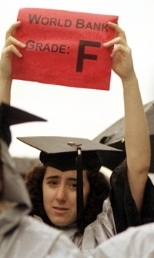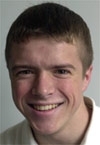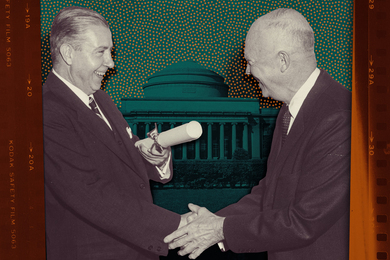Sophomore Kenneth Nesmith was chosen by lottery to join 19 other undergraduates and graduate students in a private discussion of World Bank policies with Commencement speaker James D. Wolfensohn, the Bank's president. Nesmith, who is majoring in political science, shares his observations of that meeting in the following article written for MIT Tech Talk.
As Wolfensohn shifted in his seat, turning toward the group before answering graduate student Brice Smith's somewhat inflammatory question about the Bank's history of institutional racism and resulting structural problems, his gaze paused ever so briefly on one of the professors, both of whom remained silent throughout the discussion. He slipped him just a slight wink before he replied in many more words that in his experience, such racism was not to be found at the World Bank. It was so subtle and quick a gesture amidst mannerisms so deliberate and careful that I wondered if I had mistaken a mere twitch of the eye for something meaningful. The professor's fleeting smile convinced me that I hadn't.
Yet the gesture somehow did not feel snide or off-putting; instead, it showed him to be comfortable with the group rather than embattled, and I felt freer to make stronger attacks knowing that he'd answer earnestly and without evasion. As he entered the room and took his seat at the table, he seemed uncertain but relaxed; clearly he'd faced hostile groups in the past. Our youth and energy seemed to warm and encourage him, even when aligned against him.
Wolfensohn thoughtfully answered Brice's question before moving on to further discussion of the Bank's past failures, mechanics of operation and attempts at reform. He related most of his answers to his own experiences with the Bank, sometimes avoiding theoretical discussion in favor of anecdotes of varying relevance. He spoke thoughtfully in slow, measured tones--the tones of a man shaped by an expansive depth of experience shouldered with an absolutely daunting task.
At various times, when he had trouble explaining how strongly his experience at the Bank diverged from our perceptions, or when we pushed our criticisms very strongly, he suggested that we visit the Bank to speak with the people working on these projects. The thought seemed to excite him, insofar as the aging head of the World Bank gets excited.
The students--a diverse crew of radicals and conservatives, Americans and internationals--met in Room NW30-010 on Friday morning with Wolfensohn, a small team of his assistants, the two professors, and a few administrators and security officials. This was not the room originally designated for our meeting. After gathering in Building 68, we were told that as a security precaution we would move, and two shuttle vans arrived to carry us to a new location, with policemen holding traffic along the way for our entourage. We passed through metal detectors and a bag check to find yet another spread of pastries, fruit and juices, all of us aware of the obvious ironies of this excess.
PLANNING THE MEETING
We'd met as a group just once before, several days earlier when as many of us as were able convened to form an agenda and create strategies to make the best possible use of our hour. We debated over what to discuss and how to discuss it, and though rule by committee meant that our divergent interests and purposes conflicted at times, the spirit of unity won the day, and we left to pursue final research independently with plans to confer further via e-mail.
A few of us met briefly again Thursday evening to attend a screening of Stephanie Black's PBS documentary "Life and Debt," a film about the impact of International Monetary Fund and World Bank policies in Jamaica. A reggae concert followed; its rhythmic, soulful vibrance resonated against the wooden seats and cement rafters in Room 54-100, mingling uneasily with the ghosts of a thousand lectures dedicated to the cold pursuit of scientific and mathematic truth.
The net effect of that evening was depressing; the pain detailed in the film and the beauty of the music wrought from that pain silenced my economic rebuttals to bits of criticism in the film. It left me uncomfortable with our sad world, which was made more immediate to me in the past days by the anticipation of talking with a man with the power to dramatically shift global resource alignments.
By then, I'd become very curious as to what to expect from Wolfensohn, whose job, depending on whose pamphlet I read, involved either intentionally impoverishing millions or, at best, failing to prevent the same.
I heard in Wolfensohn's answers many pieces of replies we'd heard or read in past interviews with him. When we insinuated or suggested something he believed to be simply incorrect, he would diplomatically state as much rather than offering detailed rebuttals, and we were similarly forgiving when his experiences conflicted with the general findings of our research. We each respected that one hour was not enough time to aggressively engage in factual nitpicking given the range of issues we hoped to address.
Our questions ran the gamut from remarkably broad inquiries about the Bank's theoretical economic foundations to highly specific recommendations for increasing transparency. Wolfensohn explained several of his own attempts at reform and occasionally lamented the difficulty of change in such an organization. At one point, mildly frustrated at our displeasure with the Bank's poor progress, he concluded a round of apologies by saying, "I hope that you work on these issues for the next 20 years and then students come to ask you why you haven't accomplished more."
Though some of our questions were not well researched, most were, and at our best, we brought him to look to future action to address the issues we raised.
The tightly closed nature of the forum was not encouraging, and the World Bank's repeated failures make it worthy of criticism. That criticism has come from every corner, including Nobel prize-winning economist Joseph Stiglitz, a former World Bank official; the United Nations; citizens and governments of affected nations; and career protesters.
Yet after reading Wolfensohn's work and hearing him speak of a huge variety of attempts at reform, my best impression is that he earnestly listens to his critics and works to engage and involve them in finding solutions, and has tried to bring the World Bank to do the same. Global poverty is a formidable and dreadful reality, one from which I and most of us are blessedly distant.
Though convenient, blaming one man or one institution for this is of no help. Devesh Kapur of Harvard University's Weatherhead Center for International Development, a vocal critic of the Bank, makes a key insight when he notes that "if the World Bank did not exist, we would have to create it."
While absolutely disturbed by repeated failures of Bank policy, my frustration is ultimately with the simple limitations of humans themselves. Despite tireless effort from many people working hard to end poverty, the daunting power of the problem combined with myopic missteps means that poverty remains crushingly widespread. Wolfensohn, for his part, appears dedicated completely to fighting that.
A version of this article appeared in MIT Tech Talk on June 12, 2002.








